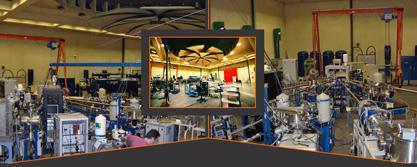
The Inter-university Master in Nuclear Physics is an official graduate degree with the participation of six Spanish universities (Autónoma de Madrid, Barcelona, Complutense de Madrid, Granada, Salamanca and Seville) with the collaboration of various groups of the Board of Scientific Research (Institute of the Structure of the Matter of Madrid and the Institute of Corpuscular Physics of Valencia) and the Center for Energy, Environmental and Technological Research (CIEMAT, Madrid). The main objectives are to enhance graduate studies in Nuclear Physics state-wide and to favor the scientific exchange between graduate students and the professors in that area. The Inter-university Master in Nuclear Physics aims to provide the students with a solid formation that covers as many fundamental aspects of the area as applicable.
The formation obtained in the Master of Nuclear Physics is not only relevant for future researchers. It is also important for those developing a professional activity in medical physics, radiology, environmental radioactivity, nuclear techniques of analysis, techniques dated by radioactive isotopes or nuclear power plants.
The Master provides the student with a unique opportunity to enter into contact with the research tasks done by the professors in the different departments involved in each one of the universities participating, which will give access to a large offer of research fields.
And in particular, the Department of Theoretical Physics offers the possibility of doing a doctoral thesis in Theoretical Nuclear Physics.
Each one of the Master’s courses will be taught basically in four phases:
Preliminary phase: The students will receive a detailed program as well as the relevant bibliography which they should know previously. This phase is of a no-presence character and will be supervised by the tutor of each student in the home university. As a common rule, the tutor should spend 10 contact hours with each student before starting in order to guide and control his/her learning level.
Theoretical phase: During the week of the course between 20 and 30 theoretical hours will be taught in order to reveal the subject matter.
Practical phase: During the week of the course between 4 and 10 hours of “in person” tutorials will be taught where doubts will be resolved and practical cases will be developed and the exercises which the students will have to solve will be raised.
Final phase: The students, at their home university, will do the proposed exercises and will turn them in for their evaluation. In this phase, the professors of the course can be consulted by means of email. In this phase, the tutor will dedicate about 10 hours in person to control the progress of the student and advise him/her in relation to the problems/work/memories required for his/her evaluation.
In the experimental courses, the theoretical phase will be shortened to accommodate the experimental work in the laboratory during the week of the course taught.
Universidad Autónoma de Madrid © 2008 · Ciudad Universitaria de Cantoblanco · 28049 Madrid · Phone: +34 91 497 51 00 · e-mail: informacion.general@uam